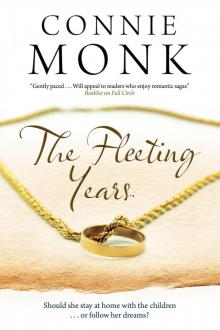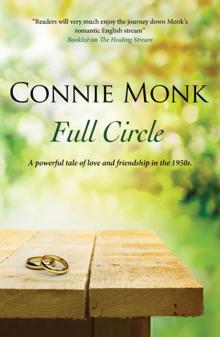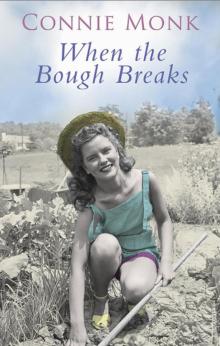- Home
- Connie Monk
The Fleeting Years Page 11
The Fleeting Years Read online
Page 11
‘I’ll tell Derek on Monday. But Peter I can’t imagine he’ll find a replacement as quickly as you seem to think.’
‘Well, dammit, he’ll just have to. Or play with one short.’ The all-too-familiar pout was back in his voice.
‘Don’t be ridiculous’ was on the tip of her tongue, but somehow she stopped herself saying it. Instead, in a matter-of-fact voice, she replied, ‘Well, fingers crossed that he knows of someone, perhaps he’s heard someone play – like he did with me, remember? But most players worth their salt are tied up already and, just like I shall, they’ll have to give a reasonable notice that they mean to leave.’
‘Well, use all your feminine guile. Tell him I’m playing up rough – or better, tell him that I am committed to go and worry about leaving you to face all these odd ends you say we have to tie up.’
No wonder she laughed. Even if he were still to be at home, there was no doubt in her mind who would be the practical one when it came to tying up odd ends.
That morning they talked of very little other than their plans and it was while they were sitting in the garden about to start lunch that Peter’s mind came round to Jenny.
‘Why did you have a row with Mother-in-law? She doesn’t usually interfere in your life,’ he said, his concentration seemingly on uncorking a bottle of wine.
‘She never interferes. It was the other way round – and I’m not proud of the way I behaved.’ He didn’t probe, but she found herself telling him anyway.
‘Derek Masters, you say? I didn’t know she even knew him.’
‘She didn’t until yesterday, that’s what makes it so stupid. Peter, I thought she was making a good life for herself without Dad. But when I warned her off Derek and said he was a confirmed bachelor and probably wanted a bit of temporary fun – it was awful. She was hysterical, saying Dad was the only one who would understand.’
For a moment Peter didn’t say anything, concentrating on pouring their wine, then digging into the salad bowl for his favourite snippets, at the same time avoiding lettuce except for one token leaf.
‘You know what I think?’
‘Something profound,’ she teased, ‘if your expression is anything to go on. Tell me.’
‘It occurs to me that Mother-in-law is due for a bit of pleasure—’
‘You think I shouldn’t have spoken about it to her? But Peter, don’t you see I had to for her own sake. Of course she was having a good time; except for Dad I don’t expect a man had paid her the sort of attention that Derek did since before she was married. When she thinks back and remembers what I said she’ll make sure she doesn’t act like it again. And she’s out with him again today – and probably tomorrow if she’s found herself a hotel for the night.’
‘What Mother-in-law needs is some fun in her life. What about if we take her for an adventure in the great US of A?’
‘Yes, of course I hope she’ll visit; it would be a lovely break for her. But she is so involved with things in the village and it’s not the sort of journey we could ask her to make for less than, say, a month. I’m sure it would make saying goodbye – especially to the children – easier for her if she knew that once we were settled she would be coming to see us. We must talk about it to her, that’ll make it less of a wrench for her when we go.’
‘I wasn’t thinking of a holiday. What about if the whole lot of us pull up sticks and go together. We’ll get a place big enough that she can have her own quarters. It would be a new life for her; she’d make new friends. Some of those American women carry their years well, I bet they don’t sit at home with their knitting – and she’s a very good-looking attractive woman.’ Then he added with a teasing twinkle in his eyes, ‘Even though you do think she’s old enough to know better.’
Did Peter have any idea how often Jenny had been irritated by his flippancy and lack of responsibility, seeing him as behaving like a stupid teenager instead of a grown man? Zina felt her eyes swim with burning tears. ‘Hey, hey, it’s not such a bad idea as that is it?’ he asked.
‘It’s a wonderful idea. Peter, you really are a very nice man.’
He was enjoying himself. He had never referred to Jenny’s unspoken criticism of him, but Zina was sure it hadn’t passed unnoticed.
So on that sunny Saturday he and Zina planned for a future, confident that their lives would be as cloudless as that June blue sky. If for her there was sadness that her cherished career, which had started so late, was to be cut short, she made sure she gave no sign of it. Peter was a wonderful success, she told herself, and she was grateful that no matter how he became richer in both fame and wealth nothing would change him. Not usually a man to show his emotions (except on the screen) but what he’d said to her that morning came back to her time and again: ‘… about fifteen years ago I fell in love with her and I’ve been in love with her ever since.’ And she knew that whatever she had to sacrifice she would follow him to the ends of the earth.
The more they discussed their arrangements the clearer it became, even to him, that he would have to go on ahead, for it would be impossible for all those ‘odd ends’ to be tied up by the second week of August.
On Sunday evening, just as he had so many times over the years, he prepared to set out for the familiar drive back to the country hotel where he lived when he was working. He’d been there for so long that the elderly couple who ran it were used to referring to Room No. Three as ‘Peter’s room’. Each working morning they would hear him drive away before six o’clock. Neither of them were filmgoers and even though they knew they had an actor under their roof it made him of no more importance than if he’d been a bank clerk or a school master. He was always pleasant, never gave them any trouble nor much work either, for he was out of the place too early for breakfast and more often than not didn’t come in until late when he’d order a whisky in the small bar and take it to his room.
Jenny listened to all Zina had to tell her, both of them determinedly avoiding any reference to their last conversation.
‘This man came to England with the intention of casting him, you say? My word, that’s an accolade. How long will he be in America?’
‘I was coming to all that, Mum. And I want you to hear it not just from our point of view but yours too. He wants us all to go, to pull up roots, the children and me, and you too. An adventure, Mum. He says we’ll get a house big enough that you have your own space. When he said “and Mother-in-law too” it seemed like providence. It’s what you need Mum, a fresh start, new friends.’ Then with a chuckle, and coming the nearest either of them had to their stormy telephone conversation, she added, ‘No more committee meetings and do-gooding.’
She’d assumed her mother would agree with no hesitation, that she would be glad to put behind her the hold the local community had on her time. But Jenny’s expression told her nothing as she said, ‘It’s kind of him, kinder than I deserve.’
‘He didn’t look on it as kindness, Mum. He wants us to go as a family.’
‘Truly, I’m grateful. I shall write and tell him so. And the thought of being without you all – the children altering all the time and me not seeing – makes it very tempting to accept. But I am what I am because this is where I belong. My future isn’t in a foreign land. I got in a state when we talked on Saturday, Zina, but even so I meant a lot of the things I said. Yes, I resent the call the village has on me, but I’m not proud to admit it. When Richard died I know it was out of kindness I was asked to do things locally – everyone needs to feel they have a purpose, that they are still necessary. That’s something that you may not understand now but you will do if ever you are left on your own, which please God you won’t be. I suppose that’s where one would say my do-gooding has come in. But things are going to be different. It’s been in my subconscious for some time, but I know now that you don’t have to serve to be necessary. There are people even in this village who never raise a finger for anyone else, but they are necessary because they radiate happiness.’ She looked very direc
tly at Zina as she chose her next words. ‘I was frightened to look ahead, just filled every day so that I didn’t have to think of the future. But now the future is … is … well, it’s changed. Don’t say anything; please don’t say anything. It’s as if a fog has lifted. Zina, can you honestly see me living amongst the glamour of Hollywood. I’d love, yes really love, to be with you, but Devon is where I belong.’
Zina wanted to know how much Derek had to do with this sudden vision for the future, but she couldn’t mention his name for fear of stirring the embers of their telephone argument.
‘Think about it, Mum. It’s come to you from out of the blue, so sleep on it for a while. I have to go to the agent in Exeter and then I shall drive on to see Derek. It’s only fair to tell him straight away.’
‘He did mention that he was going to be out all day today, though.’ She said it pleasantly just as if Derek Masters were an old family friend. ‘That was such a kind thought of Peter’s, I shall write to that hotel he stays at straight away. And now that I’ve made a decision to do less of the local stuff – all these silly societies which to be frank hold no interest for me – as soon as you get settled I’ll come a-visiting.’
And so they laid the ghost of that telephone conversation and, at least superficially, parted on their usual note of affection. Yet before Zina got a mile out of the village she passed Derek driving in the opposite direction.
Five
At the prospect of the move there was no holding Fiona’s excitement. She read the film magazines even more avidly than she had before, imagining herself as part of a world of glamour far in excess of anything she was likely to encounter even if they found the hilltop home her parents talked about. The truth was that none of them had more than a fanciful idea of life in Beverly Hills. All four of them created images of what they expected to find, each one viewing the future from a different angle. In Fiona’s mind were pictures of long, powerful, open-topped cars, glamorous women and handsome men, sunshine, visits to their home by the famous, people who up until that time had seemed to her to occupy a planet removed from mere mortals. Tom said very little. He dreaded looking towards a future where he saw the end of the dreams which for months had filled his mind. The one person who understood his unspoken fears was Zina and, if she were honest and dropped her new-found determination that she would sacrifice anything out of thankfulness that she and Peter had found their way back to each other, her own thoughts weren’t so very different from Tom’s. Peter took it for granted that they all shared his opinion: they were on the brink of sharing a new adventure. The flippancy, which was so often a part of Peter’s conversation and annoyed Jenny, gave no hint of his deep love for his profession or his intense determination which, together with natural talent, had brought him to the present stage of his career. For him, Hollywood represented a new and taller ladder to climb and he approached it with a will to succeed.
The house was on the market, but although the agent had brought one couple of would-be buyers, a look of hope on his face when he considered how much he would make from this sort of sale, it remained unsold. The couple had moved on and finally decided on a four-bedroom house with a small garden in Myddlesham for a quarter of the price. Ernest Harding, the agent, suspected they had probably only shown an interest in Newton House because they’d heard it belonged to Peter Marchand. The truth was that a property like that was unlikely to attract a local purchaser. He would have to advertise it further afield, put a picture of it in the national property magazines, but it was easier to sell half a dozen smaller run-of-the-mill houses than an old Georgian mansion in all that ground and sitting in the middle of nowhere. It had stood empty for longer than he cared to remember before the Marchands took it and had so much work done. Before that it had struck him as cold as a tomb, and although it was much more comfortable now, it must cost a mint to run. In his opinion it needed another film star, or someone who’d won the football pools, someone with ‘new money’ like the Marchands must have had when they bought it.
By the time the children were collected for their long summer holiday, work had already started on sorting out anything they wouldn’t take with them to California. Peter had rarely been seen to work with such enthusiasm in the house; nor Fiona either. Each day they filled either the boot of the Volvo or the back seat of his sports car and went to deliver their contribution to one of the various forthcoming summer fêtes where there would be appropriate stalls. At this season of the year it was in Deremouth they found the best outlet for outgrown clothes, toys, children’s books and general bric-a-brac and were received with open arms by the RNLI in their never-ending challenge to finance the lifeboat service, something for which holidaymakers gladly opened their purses. Nearer to home though, they didn’t forget the weekly stall working to pay for repairs to the church clock in Myddlesham. When they’d unloaded their one-time treasures and been thanked, Fiona couldn’t stop herself telling any voluntary helpers she hadn’t seen on earlier trips about why they were sorting out their things and how soon they would be moving to live in America. It was a thrill just to hear herself saying it.
By that time there was no escaping the fact that Peter would be travelling alone.
‘I don’t see why we can’t all go, Mum, it’d be horrid for him to set off all by himself,’ Fiona said as she and Zina were going through the bookshelf in what was known as the den. ‘And he won’t have nearly such a good time looking for a house if we aren’t there with him. If you wait for someone to come and buy this one, we might be here for ages, perhaps even by Christmas we won’t be gone. I wanted to get there and get into school and all that.’
‘Well, it’s no good grizzling to me about it,’ said Zina, not even attempting to hide her impatience. ‘Anyway, you might try and think of Tom. If we all rushed away as if we just turned our backs on everything, what about the grades he’s been working so hard for?’
‘Once he gets out there I bet he’ll do other things. And anyway he plays the piano jolly well now and I expect the fiddle too. I don’t mean to sound nasty to you, Mum, but the fiddle won’t be that much fun for him later. It’s always good to find someone who can play the piano at parties and things. Anyway, it’ll be different out there, you can see it will from the movies. He may learn to ride a horse or to sail or something. He’s quite brave.’
‘If he’d wanted to do those sort of things he could have done them here. Fiona, he loves music and you love acting.’ She remembered Tom’s giggle when she’d talked of them ‘prancing about on the stage’. ‘So how would you feel if I’d been given some wonderful chance to play in Russia or Italy or somewhere and we all had to pack up sticks and go. He might have found what he wanted amongst the people who loved that kind of music, but for you it would have been very different.’ Then, taking herself firmly in hand, she continued, ‘It’s fine to rush headlong at something that’s not going to last, but this is a big move. You’ve lived in this house as long as you can remember. When we go we shall all be sad to leave it. It may be that, although we shall come back on holiday, we shall never live in England again. We can’t just turn our backs and walk away.’
‘Well, anyway—’ Fiona meant to have the last word – ‘it’s still rotten for Dad to go on his own.’
Neither of them had noticed Peter standing outside the open doorway of the room where Fiona’s words added support to an idea that had been prodding at the back if his mind. But in un-Peter-like fashion he said nothing, sensing the moment wasn’t right.
‘That’s enough for this load, I’m taking the Volvo into Exeter. How about leaving the kids to make a start on their own stuff out in the sheds while you and I go, Zee?’ The way he said it and the use of the ‘Zee’ which was almost an endearment tipped the scales just as he meant them to. This was important. In only a few days he would be gone and the more he imagined putting his plan into action, the more eager he was to talk to her out of hearing of the twins.
They’d hardly turned out of the gate when he cou
ld wait no longer.
‘What do you think of this for a good plan? Don’t say anything, just hear me out before you jump in. There’s sound common sense in it. At the kids’ age we want as little upheaval for them as we can manage and it seems to me that we ought to aim to get them into their new school at the beginning of a term rather than have them arrive when everyone else is settled into an annual syllabus.’
‘Of course I agree with you. Ideally that’s what we could have done, but as things stand there’s nothing for it but to send them back to St Mary’s until I can bring them over.’
Peter threw a brief glance in her direction, but not so brief that she couldn’t recognize his suppressed excitement.
‘That’s no good for them. They aren’t babies; they are old enough to want to be involved in a move as important as this, not pushed around like items of luggage. I think – and I’m sure you will too if you look on it from their point of view – yes I honestly think that when I fly out next week they ought to come with me.’
Her first reaction was disbelief that he could have suggested anything so ridiculous. How could he take two children to a strange country and expect to leave them alone while his own days would be full? It was probably as well Jenny hadn’t been a fly on the windscreen listening to the conversation! Hadn’t she always known he had no sense of responsibility?
‘Whenever did you have that brainstorm? As if you could arrive out there, book into a hotel and then leave them to their own devices while you familiarize yourself with your work!’
‘It wouldn’t be like that. Honestly Zina, there is logic in it. It was Heila who suggested it – Heila Zeiglar. I had a call from Hermann just a while before we came out, that’s why I suggested you should come with me into town so that we could talk about it. Not like us, the Zeiglars were late-starters and their two youngsters are about the same age as Fiona and Tom. She says why don’t the three of us move in with them while you see to all these odd ends you say we have to sort out.’

 The Healing Stream
The Healing Stream The Fleeting Years
The Fleeting Years Full Circle
Full Circle When the Bough Breaks
When the Bough Breaks